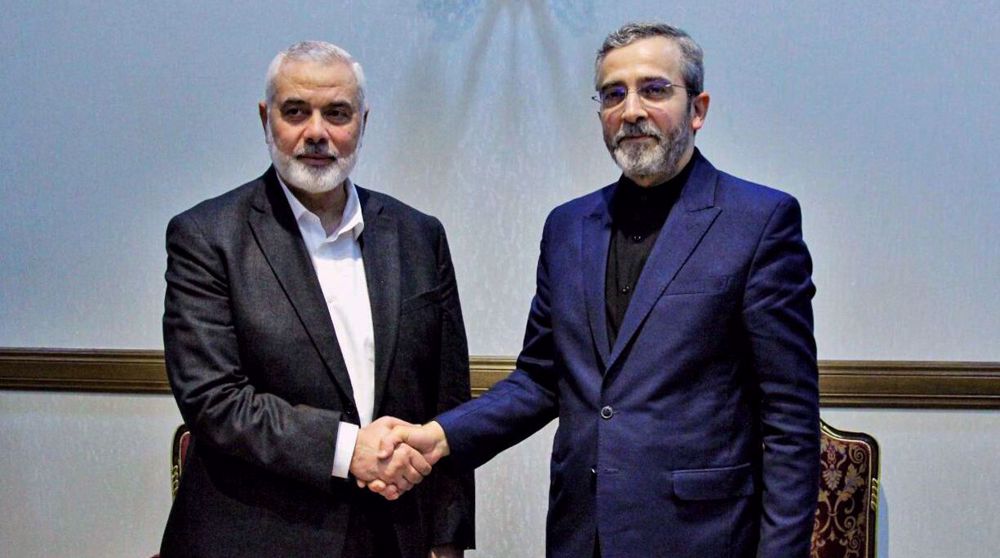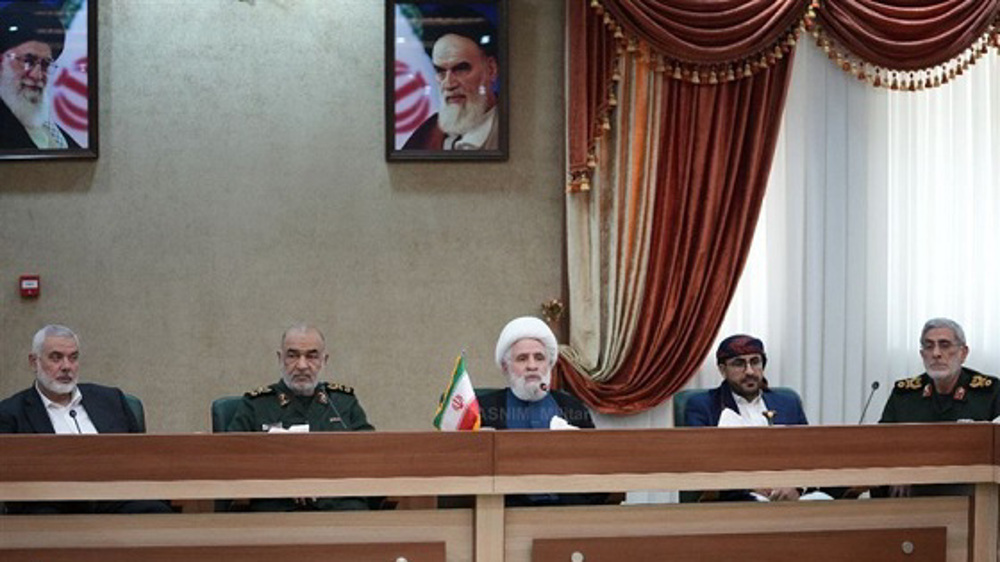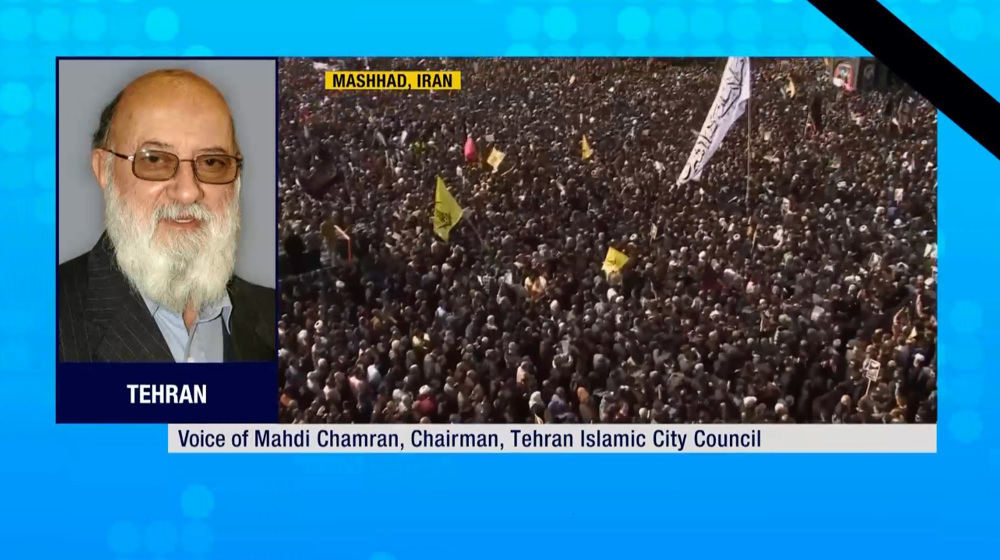Russia opposes JCPOA revision, inclusion of non-nuclear issues: FM Lavrov
Russian Foreign Minister Sergei Lavrov says the United States is the root cause of the ongoing challenges pertaining to Iran’s nuclear program, expressing Moscow’s opposition to any possible plan aimed at reviewing a landmark 2015 nuclear deal or including non-nuclear issues in it.
Lavrov made the remarks while speaking in an interview with the Islamic Republic of Iran Broadcasting (IRIB) and the Islamic Republic News Agency (IRNA) via webinar on Saturday.
He added that Russia supports Iran’s thought-out stance on the nuclear agreement, officially known as the Joint Comprehensive Plan of Action (JCPOA), which was signed between Tehran and major world powers, but opposes the position of countries that seek to include other issues in the deal.
The top Russian diplomat emphasized that the JCPOA should be neither reviewed nor renegotiated.
He said there is a consensus that the US withdrawal from the JCPOA and its re-imposition of sanctions against Iran are to blame for the present situation regarding the agreement, criticizing Washington’s “unconstructive” approach to the deal.
He emphasized certain individuals in the US political system that support the collapse of the JCPOA and believe that any agreement with Iran should be avoided.
Lavrov stressed the importance of making use of the JCPOA capacities to create a balance in commitments while making sure that Iran’s interests are balanced as per the deal, saying the nuclear agreement is a “great achievement” that has played a leading role in issues related to non-proliferation of weapons of mass destruction.
US President Donald Trump, a hawkish critic of the JCPOA, unilaterally withdrew Washington from the agreement in May 2018, and unleashed the “toughest ever” sanctions against the Islamic Republic in defiance of global criticism.
Following its much-criticized exit, Washington has been attempting to prevent the remaining signatories from abiding by their commitments and thus kill the historic agreement, which is widely viewed as a fruit of international diplomacy.
Washington reinstated the sanctions that it had lifted once it became a JCPOA member, and also started to cow others into committing to the bans and stopping their trade with Tehran.
The US unleashed the so-called maximum pressure campaign and targeted the Iranian nation with draconian restrictive measures in order to bring it to its knees, but Iran's economy keeps humming and is getting back on its feet.
The Islamic Republic adopted economic measures of “Resistive Economy” under a directive by Leader of the Islamic Revolution Ayatollah Seyyed Ali Khamenei, and also started to take nuclear countermeasures to reciprocate the United States and others’ non-commitment to the JCPOA.
Addressing the 6th edition of the Rome Mediterranean Dialogues 2020 on December 3, Iranian Foreign Minister Mohammad Javad Zarif reasserted the country’s position that the JCPOA is not open to renegotiation and that the US has to observe the agreement and the UN Resolution 2231 that endorses it.
In committing the breaches against the historic deal, the Trump administration acted as a “rogue regime,” Zarif regretted and said, “It (the United States) has obligations, responsibilities as a UN member, as a Security Council member. And there’s a Security Council Resolution 2231, which the US must observe.”
Read more:
-
Borrell: US must rejoin Iran nuclear deal as landmark of successful diplomacy
-
No new talks on JCPOA, US must answer for its illegal behavior: Foreign Ministry spokesman
- China says US should 'unconditionally' lift Iran sanctions, return to 2015 nuclear deal
Iran fulfills commitments under JCPOA
The top Russian diplomat further said that despite the US’ “provocative,” Iran has been fulfilling its commitments under the JCPOA and implementing the International Atomic Energy Agency (IAEA) Additional Protocol and the Safeguard Agreement, a move which is respected and praised by the international community.
He said Russia has adopted measures to offset the impacts of unilateral sanctions, particularly the extraterritorial ones, since the US withdrawal from the multilateral nuclear deal.
Moscow flatly rejects the West’s unilateral sanctions while it supports the Islamic Republic with different measures, from agriculture to information technologies, he pointed out.
Back in September, in an interview with Sputnik, Lavrov censured the United States for leveling “futile” accusations against Iran in a bid to demonize the Islamic Republic, saying the sanctions that Washington has imposed on Tehran in the past to strangle it “did not work before and will not work now.”
“A reliable and sustainable resolution of problems is possible only through agreements between all parties involved, while the entire current logic of the US policy is set on making Iran the focus of all containment and punishment efforts,” he added.
Read more:
-
Russia slams Europe’s dual standards on JCPOA, ‘destructive’ US actions
-
Russia blasts US for ending Iran sanctions waivers, quitting intl. treaties
Iran nuclear scientist assassination, a conspiracy
Elsewhere in his interview, Lavrov once again condemned the assassination of senior Iranian nuclear scientist Mohsen Fakhrizadeh, saying the terrorist act was a conspiracy to destabilize the region which has been grappling with many issues resulted from certain countries’ acts of adventurism and interference.
He expressed hope that results of investigations into Fakhrizadeh’s assassination would be announced soon.
He added that Russia participates in the international campaign against terrorism in line with the United Nations Charter and resolutions adopted by the General Assembly and the Security Council to fight the scourge.
Fakhrizadeh, who headed the Iranian Defense Ministry’s Organization of Defensive Innovation and Research (known by its acronym SPND), was assassinated on November 27 near Damavand in Tehran province.
In a statement issued on November 30, the Russian Foreign Ministry condemned Fakhrizadeh’s targeted killing as “provocative,” and called for restraint to avoid further escalation of regional tensions.
"We express our serious concern over the provocative nature of this terrorist act, which is clearly aimed at destabilizing the situation and building up conflict potential in the region," the ministry said.
"We call on all parties to refrain from taking steps that could lead to an escalation of tensions."
Increase in Iran-Russia trade exchanges
The Russian foreign minister also said economic and commercial cooperation between Tehran and Moscow showed a 20 percent increase last year while the two sides have managed to boost bilateral exchanges by eight percent at the time of the deadly coronavirus pandemic.
Lavrov added that Iran’s exports to Russia showed a considerable increase last year.
He noted that an agreement signed in 2018 between Iran and the Eurasian Economic Union, which was meant to facilitate trade between the two sides, opened markets of the EAEU countries to Iran.
He said the agreement between Iran and the five EAEU states has been implemented since last year, which led to a 15 percent increase in the volume of commercial exchanges between Tehran and the union while it raised the volume of Iran’s exports to the union by 30 percent.
Lavrov emphasized that Moscow would make efforts to help increase the implementation of joint projects with Tehran not only in Russia but also in other EAEU states.
Back in June, the spokesman for Iran’s customs office (IRICA), Rouhollah Latifi, said that trade with the EAEU member countries has exceeded $2.1 billion for the seven months that have passed since Tehran signed an agreement with the bloc to lower import and export tariffs.
Read more:
Colombia to open embassy in occupied West Bank’s Ramallah
China tests ‘seize power’ capability on second day of drill around Taiwan
Palestinian resistance humiliated Israel in battlefield: Iran’s acting FM
Hezbollah hits Israeli outposts, Islamic Resistance in Iraq targets Haifa
VIDEO | UK PM announces July election despite abysmal poll ratings
In Tehran, resistance officials vow struggle until ‘complete victory’
Iran Armed Forces release 1st report on Raeisi, companions copter crash
VIDEO | ‘Iran’s martyred pres., FM had great impact on today’s world’














 This makes it easy to access the Press TV website
This makes it easy to access the Press TV website